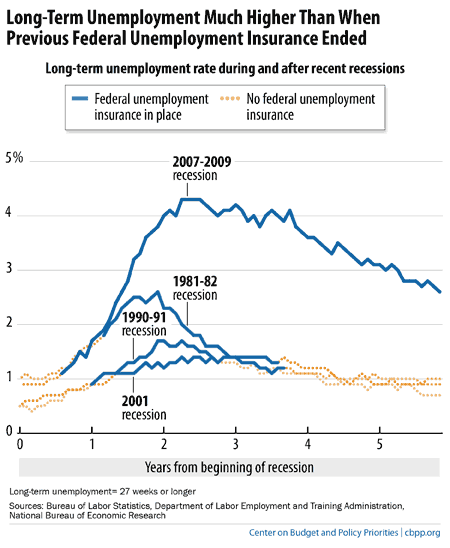BEYOND THE NUMBERS
More Than a Million Americans Will Lose Jobless Benefits at Year’s End Without Congressional Action
Legislation proposed in the House and Senate yesterday would renew the Emergency Unemployment Compensation (EUC) program through 2014, providing critical support for long-term unemployed Americans. That’s important because, without congressional action, the EUC’s benefits will end on December 31 for more than a million unemployed Americans who have been looking for work for at least six months. Many more who lost their jobs more recently or will lose them in coming months will get no additional help in 2014 beyond their regular state-funded jobless benefits, as we explain in a new paper.
EUC, like the federal emergency unemployment insurance (UI) programs enacted in every major recession since 1958, is a temporary program that provides additional weeks of UI to qualifying jobless workers during periods when jobs are hard to find. Emergency federal UI not only helps relieve hardship among those jobseekers and their families; it is also widely recognized as one of the most cost-effective ways to increase demand and spur job creation in a weak economy. Both of those tasks — relieving hardship and boosting the economy — remain necessary today.
Although the economy has been expanding for over four years, unemployment remains much too high, especially among those who have been looking for a job for six months or more:
- The unemployment rate, currently 7.3 percent, remains over two percentage points higher than when the recession started in December 2007.
- The labor force participation rate (the percentage of the population aged 16 and over either working or actively looking for work) has continued to fall even as the unemployment rate has fallen, and it has reached levels last seen in 1978 when many fewer women were in the paid labor force.
- Due to high unemployment and a falling labor force participation rate, the percentage of the population aged 16 and over with a job fell sharply in the recession and is barely higher today than when the recession hit bottom.
- Long-term unemployment remains much worse than in previous recessions. The percentage of the labor force unemployed for 27 weeks or more hit record highs in the recession and is still twice as high as when the last three federal emergency UI programs expired (see chart). Some 4.1 million of the nation’s 11.3 million unemployed workers have been looking for work for 27 weeks or longer. That’s longer than the maximum number of weeks of regular state-funded UI in all but two states.

Update, January 7, 2014: we’ve replaced the graph to correct an error in the dating of the 1980s recession.
We already have too much unemployment and economic hardship and too little economic growth and job creation. Letting EUC expire would make a bad situation worse.
Click here to read the full paper.
